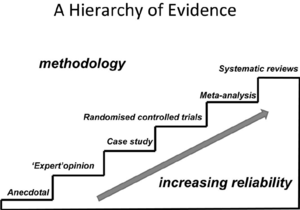Anecdotal Evidence Fallacy: Difference between revisions
mNo edit summary |
mNo edit summary |
||
| Line 1: | Line 1: | ||
[[File:Anecdotal evidence fallacy.png|alt=Anecdotal evidence fallacy|thumb|Figure 1. Anecdotal evidence is the lowest form of information.]] | |||
'''The anecdotal evidence fallacy is when someone uses a personal experience or an isolated example instead of a sound argument or compelling evidence.''' | '''The anecdotal evidence fallacy is when someone uses a personal experience or an isolated example instead of a sound argument or compelling evidence.''' | ||
Anecdotes can be be made up, misconstrued or be a statistical outlier which is insignificant when further evidence is considered.<ref>'''When and why do people act on flawed science? Effects of anecdotes and prior beliefs on evidence-based decision-making'''. Audrey L. Michal, Yiwen Zhong & Priti Shah. Cognitive Research: Principles and Implications volume 6, Article number: 28 (2021). Accessed on 15th September 2022 via <nowiki>https://cognitiveresearchjournal.springeropen.com/articles/10.1186/s41235-021-00293-2</nowiki></ref> | Anecdotes can be be made up, misconstrued or be a statistical outlier which is insignificant when further evidence is considered.<ref>'''When and why do people act on flawed science? Effects of anecdotes and prior beliefs on evidence-based decision-making'''. Audrey L. Michal, Yiwen Zhong & Priti Shah. Cognitive Research: Principles and Implications volume 6, Article number: 28 (2021). Accessed on 15th September 2022 via <nowiki>https://cognitiveresearchjournal.springeropen.com/articles/10.1186/s41235-021-00293-2</nowiki></ref> | ||
=== Example === | === Example === | ||
| Line 7: | Line 8: | ||
The dream's depiction of a god could simply be a component of the dream, which is completely anecdotal—this could have been made up to support this person's argument. Since the premise is anecdotal, it is impossible to infer its veracity. This is is an example of the anecdotal evidence fallacy. | The dream's depiction of a god could simply be a component of the dream, which is completely anecdotal—this could have been made up to support this person's argument. Since the premise is anecdotal, it is impossible to infer its veracity. This is is an example of the anecdotal evidence fallacy. | ||
== How to counter the Anecdotal Evidence Fallacy. == | |||
To get to the ''truth'' of any subject [[critical analysis]] techniques should be used to judge the authority of the information source. | |||
'''References''' | |||
<references /> | |||
Revision as of 02:38, 15 September 2022
The anecdotal evidence fallacy is when someone uses a personal experience or an isolated example instead of a sound argument or compelling evidence.
Anecdotes can be be made up, misconstrued or be a statistical outlier which is insignificant when further evidence is considered.[1]
Example
"In my dream today, God appeared, and since something must exist for it to visit me, God exists"
The dream's depiction of a god could simply be a component of the dream, which is completely anecdotal—this could have been made up to support this person's argument. Since the premise is anecdotal, it is impossible to infer its veracity. This is is an example of the anecdotal evidence fallacy.
How to counter the Anecdotal Evidence Fallacy.
To get to the truth of any subject critical analysis techniques should be used to judge the authority of the information source.
References
- ↑ When and why do people act on flawed science? Effects of anecdotes and prior beliefs on evidence-based decision-making. Audrey L. Michal, Yiwen Zhong & Priti Shah. Cognitive Research: Principles and Implications volume 6, Article number: 28 (2021). Accessed on 15th September 2022 via https://cognitiveresearchjournal.springeropen.com/articles/10.1186/s41235-021-00293-2
